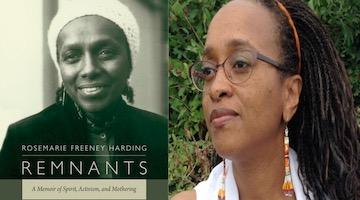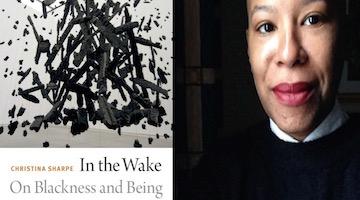BARBook Forum: Tiffany N. Florvil’s “Mobilizing Black Germany”
Black History Month strengthened Black German claims of kinship with their nation and the larger diaspora.
“Black Germans showed that Berlin and Germany were not monoracial or homogenously white, only constructed as such.”
The following is an excerpt from Tiffany N. Florvil’s book, Mobilizing Black Germany: Afro-German Women and the Making of a Transnational Movement. It is used with permission of the University of Illinois Press. Copyright 2020 by the Board of Trustees of the University of Illinois.
In 1999 the annual Black History Month event in Berlin celebrated its tenth anniversary and continued an intellectual tradition in the Black German community, evinced by afro look, Farbe bekennen, and other publications. For this event, BHM committee members, some of whom were active in ISD and the larger Black German movement, collaborated with activists from local organizations like the Pan African Forum (PAF), Europe Africa Center (Europa Afrika Zentrum, EURAFRI), Immigrant Political Forum (Immigrantenpolitisches Forum e.V., IPF), and additional groups. They organized a month-long series of workshops, panel discussions, literary readings, theater productions, film screenings, children’s activities, and social dances that revolved around the theme of “Black People and the New Media” and the legacy of the BHM. A few workshops included “Black History Month Between Fear and Hope,” “Black Victims of the Nazi Holocaust,” and “Africa’s Literature in Dialogue with Europe,” all of which reflected the committee’s willingness to draw attention to national, continental, and international developments that involved and/or impacted individuals across the Black diaspora. In this way, this BHM, like previous ones, was a clear manifestation of Black diasporic politics and solidarity.
“The committee drew attention to developments across the Black diaspora.”
The BHMs provided Black Germans with a sense of belonging with their compatriots and others; the recognition and celebration of Black history within a local German context and a broader European one proved a vital component of the Black German movement precisely because it strengthened their claims of kinship with their nation and the larger diaspora. BHM committee members made these events not only cultural and political, but also intellectual. These were events at which Black Germans and other People of Color produced and circulated knowledge that resuscitated Black diasporic histories in and beyond Europe. Thus, the BHMs represented a culture of everyday intellectualism. Though the BHMs eventually occurred in other cities, such as Hamburg and Frankfurt, the annual events in Berlin emboldened Black Germans to pursue spatial politics that rooted them in the German nation, created physical geographies and intellectual and figurative sites, and showed their resilience and agency.
Beyond a doubt, Black Germans used the BHMs to create “a black sense of place.” Katherine McKittrick argues that a “black sense of place can be under- stood as the process of materially and imaginatively situating historical and contemporary struggles against practices of domination and the difficult entanglements of racial encounter. Racism and resistance to racism are therefore not the sole defining features of a black sense of place, but rather indicate how the relational violences of modernity produce a condition of being black in the Americas that is predicated on struggle.” Here, she focuses on plantations and prisons in the Americas as representative symbols of a Black sense of place tied to the history of transatlantic slavery, colonialism, and modernity. Though the experience of Black Germans is not located entirely in a narrative of slavery, colonialism, or the Middle Passage, they did engage in a diasporic practice of producing a Black sense of place through their annual BHMs. The lack of traditionally understood Black spaces in the German context was tied to the scattering of Black people across Germany, who often grew up in isolation from others in the diaspora, and was the result of colonization, as it occurred outside Germany’s borders, though it permeated those same borders. Therefore, Black Germans’ sense of place recognized the entanglements of violence, power, resistance, survival, and colonialism (especially given that Berlin was the location for the Congo Conference of 1884–1885) and produced alternative narratives and discourses that addressed Germany’s colonial amnesia and/or forgetting as well as the racist, exclusionary laws to secure Fortress Europe. The BHMs demonstrated how these spatial and cultural voids were in part filled through knowledge while also helping them strengthen their community, politics, and intellectualism. The BHMs not only gave Black geographies room to flourish, both symbolically and physically, but also recast them given their historical absences in a majority-white nation. Black Germans engendered a variety of Black spaces for themselves and others and imbued those figurative and literal locations with new purposes and meanings. As a result, they showed that Berlin and Germany were not monoracial or homogenously white, only constructed as such.
“Black Germans used the BHMs to create ‘a black sense of place.’”
Afro-German women and men used the BHMs to produce narratives that decentered German whiteness and constructed an alternative public sphere in Berlin. Black German quotidian intellectuals de-colonized the public sphere and public spaces for Black thought and imparted knowledge through their BHM events, which had informative and entertaining functions. The BHMs helped to reconstitute a Black archive in Germany and changed discourses that labeled some German cities as places of urban blight, economic decline, and ethnic conflict. They also claimed these newly created Black national spaces as translocal. In the process of remapping these physical geographies as Black, the BHMs also achieved a symbolic space within the Black German and Black community. This was significant in light of the nation’s Völkerschau (“Peoples Show/Human Zoo”) tradition from the nineteenth to the twenty-first centuries that placed African-descended people in zoos or circuses across the country because of their alleged “natural” or “primitive” state.
Moreover, ISD-Berlin’s annual celebrations accentuated and made Black diasporic and Black German culture central to the German experience. As with other movement activities, these celebrations rendered Blackness, and by extension Black Germanness, visible, influencing their identity (re)making, enabling them to achieve more representation, and changing whitewashed cultural politics. In many ways, the BHMs illustrate the when and where or spacetimes of Blackness and how it was constructed, defined, and enacted in Germany. Wright notes that “the only way to produce a definition of Blackness that is wholly inclusive and nonhierarchical is to understand Blackness as the intersections of constructs that locate the Black collective in history and in the specific moment in which Blackness is being imagined—the ‘now’ through which all imaginings of Blackness will be mediated.” The creation of the BHMs brought Blackness from the past into the present in an effort to change the present and the future. Black Germans gave space to the varieties of Blackness across different spacetimes while also rejecting hegemonic linear narratives at their BHMs.
Tiffany N. Florvil is an Associate Professor in the Department of History at the University of New Mexico.
COMMENTS?
Please join the conversation on Black Agenda Report's Facebook page at http://facebook.com/blackagendareport
Or, you can comment by emailing us at comments@blackagendareport.com



















